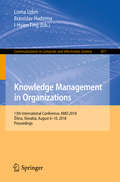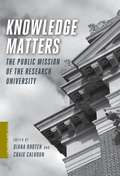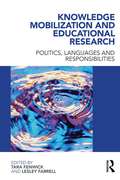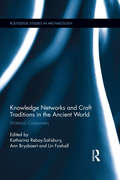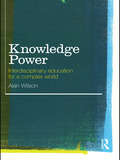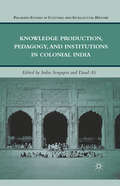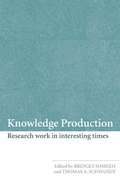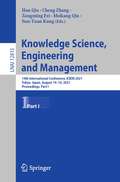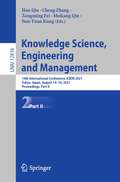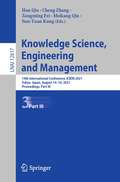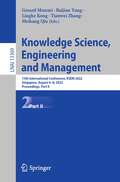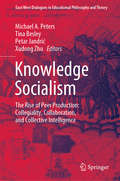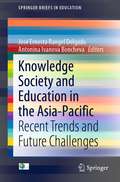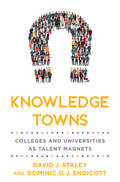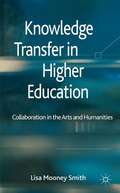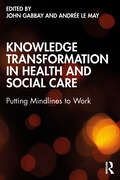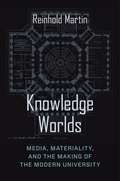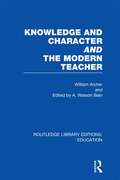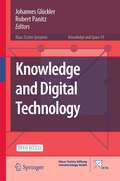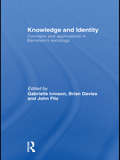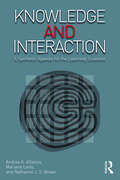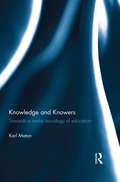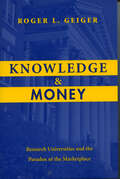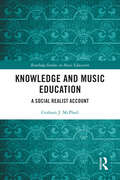- Table View
- List View
Knowledge Management in Organizations: 13th International Conference, KMO 2018, Žilina, Slovakia, August 6–10, 2018, Proceedings (Communications in Computer and Information Science #877)
by Lorna Uden I-Hsien Ting Branislav HadzimaThis book contains the refereed proceedings of the 13th International Conference on Knowledge Management in Organizations, KMO 2018, held in Žilina, Slovakia, in August 2018. The theme of the conference was "Emerging Research for Knowledge Management in Organizations."The 59 papers accepted for KMO 2018 were selected from 141 submissions and are organized in topical sections on: Knowledge management models and analysis; knowledge sharing; knowledge transfer and learning; knowledge and service innovation; knowledge creation; knowledge and organization; information systems and information science; knowledge and technology management; data mining and intelligent science; business and customer relationship management; big data and IoT; and new trends in IT.
Knowledge Matters: The Public Mission of the Research University (A Columbia / SSRC Book)
by Craig Calhoun Diana RhotenHigher education can be a vital public good, providing opportunities for students, informed citizens for democracy, and knowledge to improve the human condition. Yet public investment in universities is widely being cut, often because public purposes are neglected while private benefits dominate. In this collection, international scholars confront the realities of higher education and the future of its public and private agenda. Their perspectives illuminate the trajectory of education in the twenty-first century and the continuing importance of the university's public mission. Reporting from Asia, Africa, Europe, Latin America, and North America, these scholars look at the different ways universities struggle to serve public and private agendas. Contributors examine the implications of changes in funding sources as well as amounts, different administrative and policy decisions, and the significance of various approaches to assessment and evaluation. They ask whether wider student access has in fact resulted in social mobility, whether more scientific research can be treated as an open-access resource, how changes in academic publishing change access to knowledge, and whether universities get full value from research sold to private corporations. At the same time, these chapters capture the confusion in the university sector over explaining academic work to a broader public and prioritizing its multiple purposes. Authors examine these practical challenges and the implications of different approaches in different contexts.
Knowledge Mobilization and Educational Research: Politics, languages and responsibilities
by Tara Fenwick Lesley FarrellHow can educational research have more impact? What processes of knowledge exchange are most effective for increasing the uses of research results? How can research-produced knowledge be better ‘mobilized’ among users such as practicing educators, policy makers, and the public communities? These sorts of questions are commanding urgent attention in educational discourses and research policies now circulating around the world. This attention has been translated into powerful material exercises that shape what is considered to be worthwhile research and how research is funded, recognized, and assessed. Yet precisely what activities constitute effective knowledge mobilization, or even what is meant by ‘moving knowledge’, remains unclear. What politics are at play in determining knowledge ‘impact’ across radically different contexts? Who determines what counts as impact, and for what purposes? How are ‘results’ of educational research separated from its participants and processes? In addition knowledge mobilization also invokes debates about the languages through which knowledge is constructed, policy processes are enacted, and research unfolds. This volume is unique in bringing together these wide-ranging issues of knowledge mobilization in education. The volume editors critically analyse these complex issues and also describe various efforts of knowledge mobilization and their effects. While the contributors themselves speak from diverse material, occupational and theoretical locations. Leading scholars in Canada, the US, the UK, and Australia bring disciplinary perspectives from law, digital media studies, museum studies, journalism and policy-making as well as fields of education. Some speak from Anglo-‘Western’ perspectives but others such as Phan Le Ha (Vietnamese), Rui Yang (Chinese) and Dolores van der Wey (Haida/West Coat Salish First Nations) speak from Asian, Indigenous and diasporic locations.
Knowledge Networks and Craft Traditions in the Ancient World: Material Crossovers (Routledge Studies in Archaeology)
by Lin Foxhall Katharina Rebay-Salisbury Ann BrysbaertThis edited volume investigates knowledge networks based on materials and associated technologies in Prehistoric Europe and the Classical Mediterranean. It emphasises the significance of material objects to the construction, maintenance, and collapse of networks of various forms – which are central to explanations of cultural contact and change. Focusing on the materiality of objects and on the way in which materials are used adds a multidimensional quality to networks. The properties, functions, and styles of different materials are intrinsically linked to the way in which knowledge flows and technologies are transmitted. Transmission of technologies from one craft to another is one of the main drivers of innovation, whilst sharing knowledge is enabled and limited by the extent of associated social networks in place. Archaeological research has often been limited to studying objects made of one particular material in depth, be it lithic materials, ceramics, textiles, glass, metal, wood or others. The knowledge flow and transfer between crafts that deal with different materials have often been overlooked. This book takes a fresh approach to the reconstruction of knowledge networks by integrating two or more craft traditions in each of its chapters. The authors, well-known experts and early career researchers, provide concise case studies that cover a wide range of materials. The scope of the book extends from networks of craft traditions to implications for society in a wider sense: materials, objects, and the technologies used to make and distribute them are interwoven with social meaning. People make objects, but objects make people – the materiality of objects shapes our understanding of the world and our place within it. In this book, objects are treated as clues to social networks of different sorts that can be contrasted and compared, both spatially and diachronically.
Knowledge Power: Interdisciplinary Education for a Complex World
by Alan WilsonSuccess in the twenty-first century demands knowledge power – for individuals, organisations, cities, regions and countries. This book offers a map showing the structure of the knowledge space in a contemporary context. The routes beyond traditional disciplines are charted, in part based on the notions of superconcepts and superproblems. There are major implications for the development of education systems, particularly for universities but also for all employers as they seek to ensure that their organisations have the requisite knowledge to meet future challenges. In many instances, radical change is called for. The traditional disciplines and their future development are reviewed and systems concepts are introduced to develop an interdisciplinary framework for the future. The nature of the knowledge core for different kinds of organisation is outlined in the context of development strategies and management capabilities. Super concepts are introduced throughout and through these the reader is introduced to a range of authors who, it is argued, provide the signposts for the way ahead.
Knowledge Production, Pedagogy, and Institutions in Colonial India
by Indra Sengupta Daud AliThis volume seeks to revise the Saidian analytical framework which dominated research on the subject of colonial knowledge for almost two decades, which emphasized colonial knowledge as a series of representations of colonial hegemony. It seeks to contribute to research in the field by analyzing knowledge in colonial India as a dynamic process.
Knowledge Production: Research Work in Interesting Times
by Thomas A. Schwandt Bridget SomekhThis collection from a highly impressive international group of educational researchers explores epistemological, methodological, and ethical-political issues in the production of knowledge about educational phenomena in contemporary society. The book is organized in two sections. The first focuses on how the enterprise of knowledge production is being influenced by global discourses of educational accountability, evidence-based practice and policy, and quality assessment. The second section features material that focuses more specifically on reconceiving both methodological matters and the kinds of knowledge that demand attention in this climate. The book is unique in bringing together chapters by scholars well-known internationally for their original contributions to educational theory and research practice. Many books in this area are no more than guides on how to do research or text books reiterating rather narrow frameworks of research paradigms, this book both breaks new ground and sets the tone for discussions about the future path of educational research in the coming years.
Knowledge Science, Engineering and Management: 14th International Conference, KSEM 2021, Tokyo, Japan, August 14–16, 2021, Proceedings, Part I (Lecture Notes in Computer Science #12815)
by Meikang Qiu Han Qiu Cheng Zhang Zongming Fei Sun-Yuan KungThis three-volume set constitutes the refereed proceedings of the 14th International Conference on Knowledge Science, Engineering and Management, KSEM 2021, held in Tokyo, Japan, in August 2021.The 164 revised full papers were carefully reviewed and selected from 492 submissions. The contributions are organized in the following topical sections: knowledge science with learning and AI; knowledge engineering research and applications; knowledge management with optimization and security.
Knowledge Science, Engineering and Management: 14th International Conference, KSEM 2021, Tokyo, Japan, August 14–16, 2021, Proceedings, Part II (Lecture Notes in Computer Science #12816)
by Meikang Qiu Han Qiu Cheng Zhang Zongming Fei Sun-Yuan KungThis three-volume set constitutes the refereed proceedings of the 14th International Conference on Knowledge Science, Engineering and Management, KSEM 2021, held in Tokyo, Japan, in August 2021.The 164 revised full papers were carefully reviewed and selected from 492 submissions. The contributions are organized in the following topical sections: knowledge science with learning and AI; knowledge engineering research and applications; knowledge management with optimization and security.
Knowledge Science, Engineering and Management: 14th International Conference, KSEM 2021, Tokyo, Japan, August 14–16, 2021, Proceedings, Part III (Lecture Notes in Computer Science #12817)
by Meikang Qiu Han Qiu Cheng Zhang Zongming Fei Sun-Yuan KungThis three-volume set constitutes the refereed proceedings of the 14th International Conference on Knowledge Science, Engineering and Management, KSEM 2021, held in Tokyo, Japan, in August 2021.The 164 revised full papers were carefully reviewed and selected from 492 submissions. The contributions are organized in the following topical sections: knowledge science with learning and AI; knowledge engineering research and applications; knowledge management with optimization and security.
Knowledge Science, Engineering and Management: 15th International Conference, KSEM 2022, Singapore, August 6–8, 2022, Proceedings, Part II (Lecture Notes in Computer Science #13369)
by Meikang Qiu Linghe Kong Gerard Memmi Baijian Yang Tianwei ZhangThe three-volume sets constitute the refereed proceedings of the 15th International Conference on Knowledge Science, Engineering and Management, KSEM 2022, held in Singapore, during August 6–8, 2022. The 169 full papers presented in these proceedings were carefully reviewed and selected from 498 submissions. The papers are organized in the following topical sections:Volume I:Knowledge Science with Learning and AI (KSLA)Volume II:Knowledge Engineering Research and Applications (KERA)Volume III:Knowledge Management with Optimization and Security (KMOS)
Knowledge Socialism: The Rise of Peer Production: Collegiality, Collaboration, and Collective Intelligence (East-West Dialogues in Educational Philosophy and Theory)
by Michael A. Peters Xudong Zhu Petar Jandrić Tina BesleyThis is the first collection focusing on knowledge socialism, a particularly apt term used to describe a Chinese socialist mode of production and socialist approach to development and modernity based around the rise of peer production, new forms of collaboration and collective intelligence. Making the case for knowledge socialism, the book is intended for students, teacher, scholars and policy theorists in the field of knowledge economy.
Knowledge Society and Education in the Asia-Pacific: Recent Trends and Future Challenges (SpringerBriefs in Education)
by José Ernesto Rangel Delgado Antonina Ivanova BonchevaThis book explores recent trends in the knowledge-based society and education field in Asia-Pacific and discusses future challenges in the region. It presents studies on the development of scientific thought in the field on the knowledge-based society in the Pacific Circle. This book explores the theoretical framework of the knowledge-based society framed by the borders imposed by the Pacific Ocean, particularly from the perspective of the Pacific Circle Consortium (PCC), in the face of a paradigm shift to satisfy the human needs that must be preserved to guarantee economic and human conditions that future development requires. It analyzes how education relates to the knowledge society in the Asia Pacific region, and considers global issues such as environmental degradation, climate change, pollution, soil erosion, growth of the population. It discusses how these issues concerns parents, educators, civil societies and governments of the countries around the Pacific Circle. This book explores the necessity of changing the current transformative paradigm to one that ensures environmental sustainability, with the support of scientific education and research, as an issue that must be integrated into the curricula in schools at all educational levels.
Knowledge Towns: Colleges and Universities as Talent Magnets (Higher Education and the City)
by David J. Staley Dominic D. EndicottThe remote work revolution presents a unique opportunity for higher education institutions to reinvent themselves and become talent magnets.In Knowledge Towns, David J. Staley and Dominic D. J. Endicott argue that the location of a college or university is a necessary piece of any region's effort to attract remote knowledge workers and accelerate economic development and creative placemaking. Just as every town expects a church, bank branch, post office, and coffeehouse, Staley and Endicott write, we will see a decentralized network of institutions of higher education flourish, acting as cornerstones for the post-pandemic rebuilding of our society and economy. In calling for a "college in any town," they are not simply proposing placing a traditional college within a town or city, but envisioning instead a particular kind of higher education institution called a "knowledge enterprise." In addition to providing the services of a traditional college, a knowledge enterprise acts as a talent magnet, attracting workers looking to move to cheaper and more attractive destinations.With the post-COVID-19 shift to more remote work, and millions of people moving to more affordable and livable cities, a place that wants to attract talent will require a thriving academic environment. This represents a new opportunity for "town and gown" to create collaborative communities. The pandemic has accelerated existing trends that put at risk the viability of many colleges and universities, as well as that of many towns and cities. The talent magnet strategy outlined in this book offers colleges and towns a plan of action for regeneration.
Knowledge Transfer in Higher Education
by Lisa Mooney SmithA presentation of four years of close observation of research and knowledge transfer practices in a university. It attempts to contextualise knowledge transfer within the arts and humanities, as well as situate learning about the reception and adoption of it by the individual scholar and the organisation in which they operate.
Knowledge Transformation in Health and Social Care: Putting Mindlines to Work
by Andrée Le May John GabbayThe term ‘mindlines’ has become common currency in the world of research implementation and evidence-based practice. This book updates, develops and applies the mindlines model more widely. It sheds light on how we can realistically mobilise and transform research-based evidence into practice in context. This illuminating book shows how the mindlines model can be put to work. It highlights how practitioners collectively share and internalise implicit, flexible ways of rapidly handling complex clinical situations. Drawing on research and reflective studies from practice, education, and guidelines-development across a wide range of international health and care settings, the authors unpack the general components of mindlines. They find practical ways to uncover, bring together and apply specific mindlines to improve practice; and to develop evidence-based healthcare policy, practice and education in ways that capitalise on the crucial role of mindlines. Closely edited by the originators of the mindlines model, this book brings together the work of a cohesive group of researchers and practitioners to showcase and develop its theory and consequences. It is an essential read for all those interested in knowledge mobilisation, evidence-based practice, and research implementation both within healthcare and beyond.
Knowledge Translation in Context
by Anne Marshall Bonnie Leadbeater Elizabeth M. BanisterThe main goal of knowledge translation (KT) is to ensure that diverse communities benefit from academic research results through improved social and health outcomes. But despite growing interest in researcher-user collaborations, little is known about what makes or breaks these types of relationships. Knowledge Translation in Context is an essential tool for researchers to learn how to be effective partners in the KT process.Drawing on expertise and studies from across the globe, Elizabeth Banister, Bonnie Leadbeater, and Anne Marshall outline a variety of perspectives on KT processes. Case studies outline the uses of KT in many contexts, including community, policy, Indigenous, and non-profit organizations. While recognizing the specificity of each situation, Knowledge Translation in Context highlights the most important elements that have led KT to succeed (or fail) as a dynamic, multidirectional process.
Knowledge Worlds: Media, Materiality, and the Making of the Modern University
by Reinhold MartinWhat do the technical practices, procedures, and systems that have shaped institutions of higher learning in the United States, from the Ivy League and women’s colleges to historically black colleges and land-grant universities, teach us about the production and distribution of knowledge? Addressing media theory, architectural history, and the history of academia, Knowledge Worlds reconceives the university as a media complex comprising a network of infrastructures and operations through which knowledge is made, conveyed, and withheld.Reinhold Martin argues that the material infrastructures of the modern university—the architecture of academic buildings, the configuration of seminar tables, the organization of campus plans—reveal the ways in which knowledge is created and reproduced in different kinds of institutions. He reconstructs changes in aesthetic strategies, pedagogical techniques, and political economy to show how the boundaries that govern higher education have shifted over the past two centuries. From colleges chartered as rights-bearing corporations to research universities conceived as knowledge factories, educating some has always depended upon excluding others. Knowledge Worlds shows how the division of intellectual labor was redrawn as new students entered, expertise circulated, science repurposed old myths, and humanists cultivated new forms of social and intellectual capital. Combining histories of architecture, technology, knowledge, and institutions into a critical media history, Martin traces the uneven movement in the academy from liberal to neoliberal reason.
Knowledge and Character bound with The Modern Teacher (Routledge Library Editions: Education)
by William ArcherWritten before, but published after The First World War, this volume’s plea for a national system of education which will produce a nation of prosperous, morally fulfilled people able to live at peace with other nations is doubly poignant given the sacrifice of the ‘lost generation’. However, the author also sees the horror of the War as an opportunity to change human destiny through education, an opportunity to abandon the narrow system of education in favour of one which will ‘bring education in touch with life’ and provide Britain with the intellectual and moral efficiency necessary to steer her through the following turbulent years of the twentieth century. Covering the core subjects of the English school curriculum in the early twentieth century the chapters in The Modern Teacher, if somewhat utopian, describe best practice in teaching of the particular subject and suggest possible improvements. One chapter also discusses the importance of the relatively new subject of citizenship, as well as the moral education of pupils.
Knowledge and Digital Technology (Knowledge and Space #19)
by Johannes Glückler Robert PanitzThis open access book explores the multifaceted interplay of technology, knowledge, and place. While digital technology is increasingly influencing our way of knowing, conversely it is itself the consequence of human creativity and local social interaction. Part I analyzes how digital technologies transform markets through artificial intelligence and decentralized blockchain models. Its contributions discuss novel governance mechanisms, including the responsible use and analysis of big data. Part II illustrates various ways in which technology supports humanity, be it algorithms supporting complex decision-making processes or the use of robotics in care services. The chapters highlight that technology's efficiency and potential rely on social norms and human capital. Finally, Part III shows that digitization is generating vibrant entrepreneurship, reflected in geographically clustered urban scale-up economies, as well as opening up new ways for people to connect with one another, organize civic engagement and enable new forms of labor. The book offers theoretical reflections as well as empirical cases from the United States, Canada, Japan, South Africa, and Europe. This volume provides a valuable read for scholars, students and professionals in the fields of knowledge creation, technology and governance.
Knowledge and Identity: Concepts and Applications in Bernstein's Sociology
by Gabrielle IvinsonWhat in the digital era is knowledge? Who has knowledge and whose knowledge has value? Postmodernism has introduced a relativist flavour into educational research such that big questions about the purposes of education have tended to be eclipsed by minutiae. Changes in economic and financial markets induce a sense that we are also experiencing an intellectual credit crunch. Societies can no longer afford to think about the role of education merely in relation to national markets and national citizenry. There is growing recognition that, once again, we need big thinking using big theoretical ideas in working on local problems of employability, sustainability and citizenship. Drawing on aspects of Bernstein’s work that have attracted an international following for many years, the international contributors to this book raise questions about knowledge production and subjectivity in times dominated by market forces, privatisation and new forms of state regulation. The book is divided into three sections: Part one extends Bernstein’s sociology of knowledge by revitalizing fundamental questions, such as: what is knowledge, how is it produced and what are its functions within education and society in late modernity? It demonstrates that big theory, like big science, provides immense resources for thinking ourselves out of crisis because, in contradistinction to micro theory, we are able to contemplate global transformations in ways which otherwise would remain unthinkable. Part two considers the new, hybrid forms of knowledge that are emerging in the gap opened up between economic markets and academic institutions across a range of countries. Bernstein said in the 1970s that schools cannot compensate for society but we might now ask: can universities compensate for the economy? Part three adds new conceptual tools to the understanding of subjectivity within Bernstein's sociology of knowledge and elaborates conceptual developments about pedagogic regulation, consciousness and embodiment. This book will appeal to sociologists, educationists and higher educators internationally and to students on sociology of education, curriculum and policy studies courses.
Knowledge and Interaction: A Synthetic Agenda for the Learning Sciences
by Andrea A. DiSessa Mariana Levin Nathaniel J.S. BrownDecades of research in the cognitive and learning sciences have led to a growing recognition of the incredibly multi-faceted nature of human knowing and learning. Up to now, this multifaceted nature has been visible mostly in distinct and often competing communities of researchers. From a purely scientific perspective, "siloed" science—where different traditions refuse to speak with one another, or merely ignore one another—is unacceptable. This ambitious volume attempts to kick-start a serious, new line of work that merges, or properly articulates, different traditions with their divergent historical, theoretical, and methodological commitments that, nonetheless, both focus on the highly detailed analysis of processes of knowing and learning as they unfold in interactional contexts in real time. Knowledge and Interaction puts two traditions in dialogue with one another: Knowledge Analysis (KA), which draws on intellectual roots in developmental psychology and cognitive modeling and focuses on the nature and form of individual knowledge systems, and Interaction Analysis (IA), which has been prominent in approaches that seek to understand and explain learning as a sequence of real-time moves by individuals as they interact with interlocutors, learning environments, and the world around them. The volume’s four-part organization opens up space for both substantive contributions on areas of conceptual and empirical work as well as opportunities for reflection, integration, and coordination.
Knowledge and Knowers: Towards a realist sociology of education (Legitimation Code Theory)
by Karl MatonWe live in ‘knowledge societies’ and work in ‘knowledge economies’, but accounts of social change treat knowledge as homogeneous and neutral. While knowledge should be central to educational research, it focuses on processes of knowing and condemns studies of knowledge as essentialist. This book unfolds a sophisticated theoretical framework for analysing knowledge practices: Legitimation Code Theory or ‘LCT’. By extending and integrating the influential approaches of Pierre Bourdieu and Basil Bernstein, LCT offers a practical means for overcoming knowledge-blindness without succumbing to essentialism or relativism. Through detailed studies of pressing issues in education, the book sets out the multi-dimensional conceptual toolkit of LCT and shows how it can be used in research. Chapters introduce concepts by exploring topics across the disciplinary and institutional maps of education: -how to enable cumulative learning at school and university-the unfounded popularity of ‘student-centred learning’ and constructivism -the rise and demise of British cultural studies in higher education-the positive role of canons -proclaimed ‘revolutions’ in social science -the ‘two cultures’ debate between science and humanities-how to build cumulative knowledge in research-the unpopularity of school Music-how current debates in economics and physics are creating major schisms in those fields. LCT is a rapidly growing approach to the study of education, knowledge and practice, and this landmark book is the first to systematically set out key aspects of this theory. It offers an explanatory framework for empirical research, applicable to a wide range of practices and social fields, and will be essential reading for all serious students and scholars of education and sociology.
Knowledge and Money: Research Universities and the Paradox of the Marketplace
by Roger L. GeigerMarket forces have profoundly affected the contemporary research university's fundamental tasks of creating and disseminating knowledge. They arguably have provided American universities access to greater wealth, better students, and stronger links with the economy. Yet they also have exaggerated inequalities, diminished the university's control over its own activities, and weakened the university's mission of serving the public. Incorporating twenty years of research and new data covering 99 research universities, Knowledge and Money explains this paradox by assessing how market forces have affected universities in four key spheres of activity: finance, undergraduate education, primary research, and participation in regional and national economic development. The book begins by chronicling how universities have enlarged revenues by optimizing tuitions, and how they have managed these funds. It reveals why competition for the best students through selective undergraduate admissions has led to increased student consumerism and weakened university control over learning. The book also explains why research has become an increasingly autonomous activity within the university, expanding faster than class instruction or faculty resources. Finally, it shows how the linkage of research to economic development has engendered closer ties with industry and encouraged the commercialization of knowledge.
Knowledge and Music Education: A Social Realist Account (Routledge Studies in Music Education)
by Graham J. McPhailKnowledge and Music Education: A Social Realist Account explores current challenges for music education in relation to wider philosophical and political debates, and seeks to find a way forward for the field by rethinking the nature and value of epistemic knowledge in the wake of postmodern critiques. Focusing on secondary school music, and considering changes in approaches to teaching over time, this book seeks to understand the forces at play that enhance or undermine music’s contribution to a socially just curriculum for all. The author argues that the unique nature of disciplinary-derived knowledge provides students with essential cognitive development, and must be integrated with the turn to more inclusive, student-centred, and culturally responsive teaching. Connecting theoretical issues with concrete curriculum design, the book considers how we can give music students the benefits of specialised subject knowledge without returning to a traditional past.
